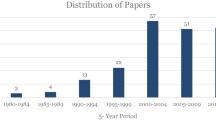Abstract
Traditional studies on measurements and training of teamwork have often focused on observational teamwork behaviors; however, measurements and training of unobservable teamwork such as mutual performance monitoring are also important for improving teamwork measurement and training. In addition, an improvement of cognitive mechanisms underlying teamwork must effectively be able to enhance team performance because sufficient situation awareness of status of team is expected to be a requirement for positive teamwork behaviors. This study focuses on metacognition in cooperation that underlies team cooperation and aims to investigate the importance of metacognition in cooperation by analyzing contents of reflection on cooperation collected in our previous study in terms of our proposed model about metacognition in cooperation. The comparisons of metacognition in cooperation elicited in a team experiment and team performance indexes suggest that an expansion of range of metacognition in cooperation by metacognitive instructions will enhance team performance and that certain types of metacognition in cooperation are important for positive teamwork.







Similar content being viewed by others
References
Catchpole K, Mishra A, Handa A, McCulloch P (2008) Teamwork and error in the operating room—analysis of skills and roles. Ann Surg 247(4):699–706
Chant SR, Ernst Z (2007) Group intentions as equilibria. Philos Stud 133(1):95–109
Cooke NJ, Gorman JC, Winner JL (2007) Team cognition. In: Durso F, Nickerson R, Dumais S, Lewandowsky T (eds) Handbook of applied cognition, 2nd edn. Wiley, London, pp 239–268
Endsley MR, Jones WM (2001) A model of inter- and intrateam situation awareness: implications for design, training, and measurement. In: McNeese M, Salas E, Endsley M (eds) New trends in cooperative activities: understanding system dynamics in complex environments. Human Factors and Ergonomics Society, Santa Monica, pp 46–67
Flin R, Martin L (2001) Behavioral markers for crew resource management: a review of current practice. Int J Aviat Psychol 11(1):95–118
McDougall W (1921) The group mind. Putnam, New York
Mishra A, Catchpole K, McCulloch P (2009) The oxford NOTECHS system: reliability and validity of a tool for measuring teamwork behaviour in the operating theatre. Qual Saf Health Care 18(2):104–108
Nelson TO, Narens L (1994) Why investigate metacognition? In: Metcalfe J, Shimamura AP (eds) Metacognition: knowing about knowing. MIT Press, Cambridge, pp 1–25
Nonose K, Kanno T, Furuta K (2012) A team cognition model derived from reflection on cooperation. Cogn Technol Work 14(1):83–92
Rousseau V, Aube C, Savoie A (2006) Teamwork behaviors—a review and an integration of frameworks. Small Group Res 37(5):540–570
Salas E, Sims DE, Burke CS (2005) Is there a “Big five” in teamwork? Small Group Res 36(5):555–599
Salas E, DiazGranados D, Klein C, Burke CS, Stagl KC, Goodwin GF, Halpin SM (2008) Does team training improve team performance? A meta-analysis. Hum Factors 50(6):903–933
Salas E, King HB, Rosen MA (2012) Improving teamwork and safety: toward a practical systems approach, a commentary on Deneckere et al. Soc Sci Med 75(6):986–989
Soraji Y, Furuta K, Kanno T, Aoyama H, Inoue S, Karikawa D, Takahashi M (2012) Cognitive model of team cooperation in en-route air traffic control. Cogn Technol Work 14(2):93–105
Tuomela R, Miller K (1988) We-intentions. Philos Stud 53:367–389
Acknowledgments
We express our deepest gratitude to the Japan Society for the Promotion of Science (JSPS) that supported this study.
Author information
Authors and Affiliations
Corresponding author
Rights and permissions
About this article
Cite this article
Nonose, K., Kanno, T. & Furuta, K. Effects of metacognition in cooperation on team behaviors. Cogn Tech Work 16, 349–358 (2014). https://doi.org/10.1007/s10111-013-0265-8
Received:
Accepted:
Published:
Issue Date:
DOI: https://doi.org/10.1007/s10111-013-0265-8




